The term "third place" was coined by the eminent American sociologist Ray Oldenburg in his 1989 book The Great Good Place.
Such places are of great importance to society: they allow people to meet, talk freely and exchange ideas informally.
According to Oldenburg, a place can be called a "third place" if it meets the following eight characteristics:
- It is a neutral ground: the third place is a place where there is no obligation on either side (guest/host for example), facilitating the creation or development of friendships.
- Openness: the third place is a place open to all.
- It is a place where people can communicate and exchange ideas freely.
- It is a welcoming and easily accessible place.
- It is a hard core. A third place is characterized by the community that gives it life and direction.
- It welcomes people from all walks of life.
- It is a good place to live. The atmosphere is friendly and the activities and discussions take place with respect for others.
- It's a home away from home. Third-party regulars feel at home here, and sometimes even better than at home.
Billiard clubs more or less fit this definition. In exchange for a fee to help the managers support the club, they offer a space for learning, exchange, mutual emulation and the transmission of first-rate knowledge. Since billiards is an activity open to all (regardless of age, gender or social class), clubs are the ideal place to meet people who are not necessarily like you, and expose yourself to people with different profiles and ideas than your own.
For children, it is a great way to learn about social life, but also to teach them how to concentrate and stay calm.
In short, the pool club next door may be a great way to socialize and discover a whole bunch of new things. All you have to do is push open the doors and get kitted out at Doozy.

